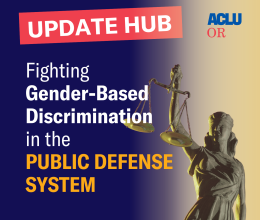
The ACLU of Oregon joined ACLU National, the Lawyers’ Committee for Civil Rights Under Law and the Lewis & Clark Law School Criminal Justice Reform Clinic in filing an amicus brief urging the Oregon Supreme Court to direct lower level courts to dismiss criminal cases for which public defense attorneys are not available and to allow public defense attorneys to withdraw from cases if they are too overloaded to provide adequate representation for their client.
In May 2023, Public Defenders of Marion County (PDMC) Executive Director, Shannon Wilson, asked the Oregon Supreme Court to stop Marion County judges from forcing their attorneys to take on new cases over their objections. Attorneys for PDMC objected to taking new clients because they were already over capacity with their existing caseload and therefore couldn’t ethically take more cases without jeopardizing their existing clients’ rights. The case demonstrates the severity and the human impacts of Oregon’s ongoing public defense crisis, and presents an opportunity for the Oregon Supreme Court to offer more immediate relief to defendants in limbo.
Every Oregonian accused of a crime has a Constitutional right to be represented by an attorney who has the skills and capacity to zealously represent them in their case. For those who can’t afford one, the state is responsible for providing a public defense attorney. However, high caseloads combined with a shortage of public defense attorneys is creating a Constitutional crisis. Thousands are caught in legal jeopardy — some stuck in jail — because they aren’t able to afford an attorney and the state cannot provide one.
While the impact of the public defense crisis is wide reaching, it disproportionately impacts Black, Indigenous, and Latino Oregonians. Black, Indigenous, and Latino people are arrested and incarcerated at much higher rates than white people. Nationwide, Black people are 4.7 times more likely than white people to have a public defender and Latino people are 2.1 times more likely to have a public defender than white people. Because of the higher rates of engagement with both the criminal legal system as a whole and public defenders in particular, this crisis inevitably creates disparate impacts for Black, Indigenous and Latino people.
The 2023 Oregon Legislature passed reforms and infused the system with significant funding to address some of the systemic public defense issues. However, the people most impacted by this crisis need more immediate relief, which the recently-passed legislation does not provide.
Oral arguments, where the Oregon Supreme Court will hear from attorneys representing Wilson and the State, are scheduled for September 19, 2023.







